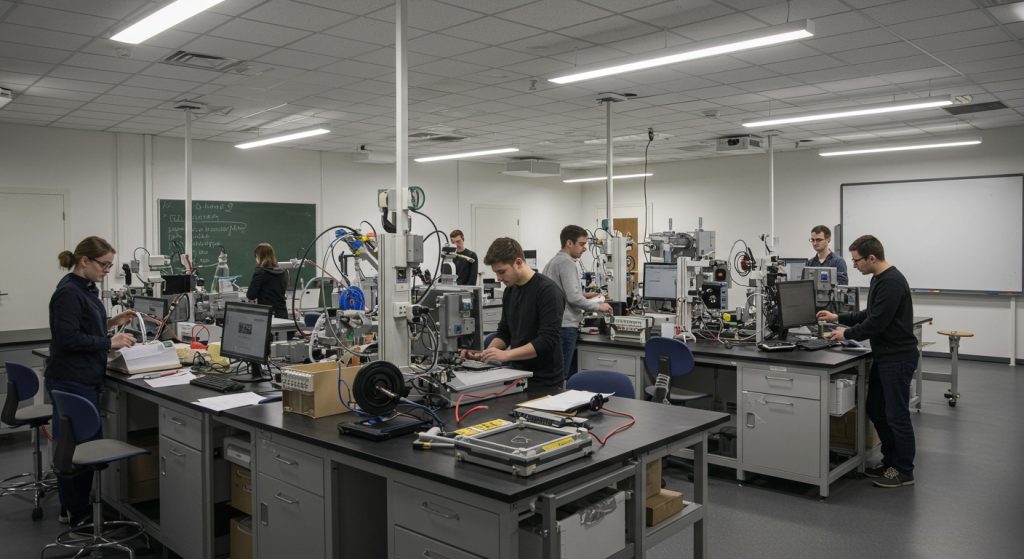Precision engineering, advanced materials. Cutting-edge automation are driving the future of mechanical engineering. Germany, with its strong industrial base and commitment to innovation, stands as a global leader in this field. The demand for skilled mechanical engineers is surging, fueled by advancements in Industry 4. 0, sustainable energy. Electric mobility.
Choosing the right university is crucial for aspiring mechanical engineers. This selection hinges on factors like research opportunities, industry collaborations. Specialized programs. We will delve into the top German universities renowned for their mechanical engineering programs, highlighting their unique strengths and areas of expertise.
Expect a journey through institutions known for their rigorous curriculum, state-of-the-art facilities. Strong industry connections. Discover the opportunities awaiting you in Germany’s prestigious academic landscape, paving the way for a successful career in mechanical engineering.
Understanding the German Engineering Landscape
Germany has a long and storied history of excellence in engineering, particularly in mechanical engineering. This reputation is built on a foundation of rigorous academic standards, close ties with industry. A commitment to innovation. Choosing the right university can be a daunting task. Understanding the key factors that contribute to a program’s quality is crucial. When evaluating universities, consider not only their rankings but also their research focus, industry connections. The specific specializations offered within mechanical engineering. Some universities excel in areas like automotive engineering, while others may be stronger in manufacturing or robotics. Finding a program that aligns with your interests and career goals is paramount. Ultimately, the “best” university is subjective and depends on your individual priorities. Are you seeking a program with a strong theoretical foundation or one with more practical, hands-on experience? Do you prioritize research opportunities or industry internships? Answering these questions will help you narrow down your options and make a more informed decision.
Key Criteria for Evaluating Mechanical Engineering Programs
Several factors contribute to the strength of a mechanical engineering program in Germany. Research output is a significant indicator, reflecting the university’s commitment to pushing the boundaries of knowledge. Look for universities with active research groups in areas that interest you. Industry collaborations are also vital. A strong connection with industry can provide students with valuable internship opportunities, access to cutting-edge technologies. A better understanding of real-world engineering challenges. Pay attention to the university’s partnerships with companies in your field of interest. Finally, consider the program’s curriculum and faculty. Does the curriculum cover the fundamental principles of mechanical engineering while also offering specialized courses in emerging areas? Are the faculty members experts in their respective fields and actively involved in research? A well-rounded program with experienced faculty will provide you with a solid foundation for your career.
Top Universities for Mechanical Engineering in Germany
Several German universities consistently rank among the best in the world for mechanical engineering. These institutions offer a combination of rigorous academics, cutting-edge research. Strong industry connections. Here’s a look at some of the top contenders:
- RWTH Aachen University: Renowned for its strong focus on practical application and close ties with industry, particularly in automotive and manufacturing.
- Technical University of Munich (TUM): A leading research university with a broad range of specializations in mechanical engineering, including robotics, aerospace. Energy technology.
- Karlsruhe Institute of Technology (KIT): Known for its strong research focus and its contributions to areas like energy, mobility. Data technology. This is also covered in Germany’s Best Engineering Programs: A Cost-Effective Analysis.
- University of Stuttgart: A leading university in automotive engineering and related fields, with strong collaborations with major automotive manufacturers.
- Technical University of Berlin (TU Berlin): Offers a wide range of mechanical engineering specializations, with a strong focus on research and innovation.
Choosing among these top universities can be challenging, as each has its unique strengths. Consider your specific interests and career goals when making your decision. Visiting the campuses and speaking with current students and faculty can also provide valuable insights.
Career Prospects and Outcomes for Mechanical Engineers in Germany
A mechanical engineering degree from a reputable German university can open doors to a wide range of career opportunities. Germany’s strong manufacturing sector, particularly in automotive, aerospace. Engineering goods, creates a high demand for skilled mechanical engineers. Graduates can find employment in various roles, including design engineering, manufacturing engineering, research and development. Project management. Many also pursue careers in consulting or entrepreneurship. The German engineering education system emphasizes practical skills and problem-solving abilities, making graduates highly sought after by employers. Moreover, Germany’s strong economy and high quality of life make it an attractive destination for international students seeking to build their careers. With a mechanical engineering degree from a top German university, you’ll be well-positioned for success in a globalized job market.
Application Process and Tips for International Students
Applying to German universities as an international student requires careful planning and preparation. The application process typically involves submitting academic transcripts, standardized test scores (e. G. , TOEFL or IELTS for English proficiency). A statement of purpose. Some universities may also require letters of recommendation. It’s essential to research the specific requirements of each university you’re interested in and to start the application process well in advance of the deadlines. Many German universities offer programs taught in English. Learning some German can significantly enhance your experience and job prospects. Consider taking advantage of resources available to international students, such as international student offices and online forums. These resources can provide valuable guidance and support throughout the application process and during your studies in Germany.
Conclusion
Choosing the right German university for Mechanical Engineering is a significant step, demanding careful consideration beyond rankings. Remember that practical experience, cultivated through internships and research opportunities, is just as crucial as theoretical knowledge. Don’t underestimate the importance of networking; attending industry events and connecting with alumni can open doors to valuable career paths. The future of Mechanical Engineering is evolving rapidly, with fields like robotics and sustainable energy gaining prominence. Therefore, consider specializations that align with these emerging trends to future-proof your degree. Finally, remember that the journey is just as crucial as the destination. Embrace the challenges, learn from your experiences. Approach your studies with passion and determination. Your dedication to continuous learning will set you apart and pave the way for a successful and fulfilling career. Consider researching Germany’s Best Engineering Programs: A Cost-Effective Analysis for additional insights.
FAQs
Okay, so what are the top universities in Germany for Mechanical Engineering? I’m talking cream of the crop!
Alright, if we’re talking top-tier, you’ll consistently see names like RWTH Aachen University, Technical University of Munich (TUM), Karlsruhe Institute of Technology (KIT). University of Stuttgart popping up. These are generally considered the powerhouses for MechEng in Germany.
What makes these universities so good, anyway?
Good question! It’s a combo of things. They have world-renowned professors, cutting-edge research facilities, strong industry connections (think internships and job opportunities!).A rigorous curriculum that’ll really push you. Plus, they often offer specialized programs within Mechanical Engineering, so you can really focus on what interests you.
Is there a big difference between them, or are they all pretty much the same?
While they’re all excellent, they do have their own strengths. TUM and KIT are super strong in research and innovation, often attracting a lot of international students. RWTH Aachen has a fantastic reputation for practical application and industry collaboration. Stuttgart has a strong focus on automotive engineering, naturally, given its location.
What about the language? Do I need to be fluent in German to study there?
That depends! Some programs, especially at the Master’s level, are taught entirely in English. But, learning German is HIGHLY recommended, even if your courses are in English. It’ll make your life much easier, both socially and when it comes to internships and job hunting.
What’s the deal with tuition fees? Is it going to break the bank?
Good news! Public universities in Germany generally have very low tuition fees, especially compared to the US or the UK. You’ll mostly be paying a semester contribution, which covers administration costs and student services. But, keep in mind that living expenses in Germany can still add up, especially in cities like Munich or Berlin.
Are there any other good universities for Mechanical Engineering that are maybe a bit less competitive?
Absolutely! Don’t feel like you HAVE to get into one of the top four. Universities like TU Darmstadt, Leibniz University Hannover. TU Berlin also offer excellent Mechanical Engineering programs and might be slightly less competitive. They still provide a fantastic education and great opportunities.
Okay, last one! How do I even apply?
The application process usually involves submitting your academic transcripts, a letter of motivation, proof of language proficiency (either German or English). Sometimes letters of recommendation. You’ll typically apply through the university’s online portal or through uni-assist, a centralized application service for international students. Make sure to check the specific requirements and deadlines for each university well in advance!



